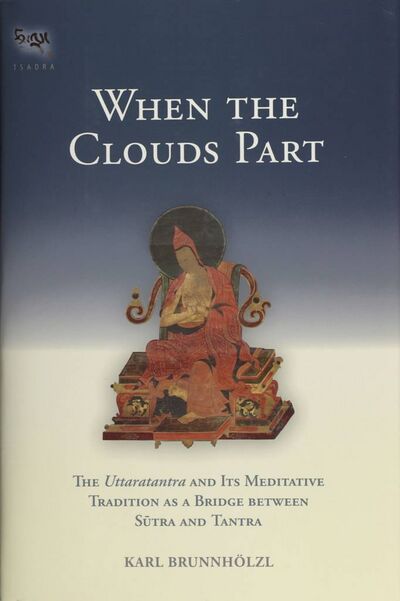When the Clouds Part
From Buddha-Nature
< Books
((by SublimeText.Mediawiker)) |
|||
| Line 13: | Line 13: | ||
|VideoService=vimeo | |VideoService=vimeo | ||
|VideoId=225908764 | |VideoId=225908764 | ||
| + | |BookEssay=<em>When the Clouds Part</em> is a translation and study of the ''Uttaratantra'', also known as the ''Ratnagotravibhāga'', and nine related texts from India and Tibet, some translated for the very first time in this publication. It is not the first translation of the text—Brunnhölzl cites two previous English translations by Obermiller (1931) and Takasaki (1958), who translated from Sanskrit and Tibetan, and Sanskrit, Tibetan, and Chinese, respectively. | ||
| + | |||
| + | The book begins with a 325-page "Translator's Introduction," a study of the sutra's sources and exegetical traditions, which is a tour de force and a major reference for buddha-nature studies. It is for highly educated readers, assuming an extensive familiarity with the issues and terms of the discussion, such as the Madhyamaka/Yogācāra divide and the doctrine of tathāgatagarbha. | ||
| + | |||
| + | The Translator's Introduction is divided into eight sections: 1) the sūtra sources for tathāgatagarbha teachings; 2) historical survey of Indian and Tibetan definitions of tathāgatagarbha; 3) the history of the transmission of the "Five Books of Maitreya" to Tibet; 4) a survey of explanations of the meaning of the title of the ''Uttaratantra''; 5) the relationship between the ''Uttaratantra'' and Yogācāra; 6) the ''Uttaratantra'' and ''zhentong''; 7) the ''Uttaratantra'' and Mahāmudrā; 8) and an outline and summary of the ten works translated. | ||
|BookToc=* {{i|[[/Abbreviations/]]|ix}} | |BookToc=* {{i|[[/Abbreviations/]]|ix}} | ||
* {{i|[[/Preface/]]|xi}} | * {{i|[[/Preface/]]|xi}} | ||
Revision as of 17:07, 14 August 2018
When the Clouds Part
Book
Book
"Buddha nature" (tathāgatagarbha) is the innate potential in all living beings to become a fully awakened buddha. This book discusses a wide range of topics connected with the notion of buddha nature as presented in Indo-Tibetan Buddhism and includes an overview of the sūtra sources of the tathāgatagarbha teachings and the different ways of explaining the meaning of this term. It includes new translations of the Maitreya treatise Mahāyānottaratantra (Ratnagotravibhāga), the primary Indian text on the subject, its Indian commentaries, and two (hitherto untranslated) commentaries from the Tibetan Kagyü tradition. Most important, the translator’s introduction investigates in detail the meditative tradition of using the Mahāyānottaratantra as a basis for Mahāmudrā instructions and the Shentong approach. This is supplemented by translations of a number of short Tibetan meditation manuals from the Kadampa, Kagyü, and Jonang schools that use the Mahāyānottaratantra as a work to contemplate and realize one’s own buddha nature. (Source: Shambhala Publications)
| Citation | Brunnhölzl, Karl. When the Clouds Part: The Uttaratantra and Its Meditative Tradition as a Bridge between Sūtra and Tantra. Tsadra Foundation Series. Boston: Snow Lion Publications, 2014. |
|---|---|


